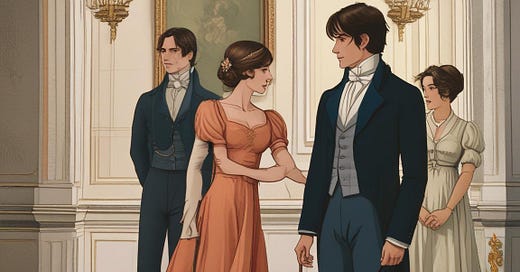Mr. Steal Your Girl, then make her cry.
Introducing Summer School! New episode on Toxic Relationships x TTPD streaming now!
Hard to believe it, but it’s been one whole school year of AP Taylor Swift! While school’s out, this summer we’re bringing you Summer School! Each week, we’ll revisit a topic from this past season within the context of songs from Taylor Swift’s latest album, “The Tortured Poets Department.” This week we’re covering the topic of toxic relationships from Episode 5.
🛍️ Shop With Us! Active Discount Codes
As we grow, we are so excited to announce new partnerships! Here you’ll find active discount codes available to our listeners.
🔉Libro.fm - Support your local bookstore while listening to great audiobooks.
Code: APTS
Offer: Get a free audiobook when you start a new membership (you must use this link!)
Receive 2 audiobook credits for $14.99 USD with your first month of membership.Code: APTS30
Offer: 30% off specific audiobooks in the AP Taylor Swift playlist.
✨ Krowned Krystals - Make the whole place shimmer with the best rhinestones
Code: APTS
Offer: 10% off your order when you use the link above
🏫 This Week’s Extra Credit - Brought to you by Maansi
Our first summer school episode sees us revisit the topic of toxic relationships in the context of The Tortured Poet’s Department. We talk about how this album is ripe with toxic relationships — those that one may have with their fans, with people they work with, with their community, and of course with their significant others. But how do toxic relationships show up in literature? Why did we decide to discuss this theme in the first place?
In literature, it’s important for characters to have fatal flaws to make them more believable and realistic. Often, flaws are revealed in the form of their toxic relationships with others. These relationships serve a dual purpose of not only revealing character flaws to ultimately make the characters feel more human but also to reflect real, relatable situations, that help readers better understand themselves and the human condition.
There are several literary toxic relationships that we have referenced in passing in our various podcast discussions, which also come up in Taylor’s music.
Husband-Wife Dynamics
Classic toxic relationships in literature often come in the form of husband-wife relationships. Historically (and arguably even today), there’s often a gap in power dynamics in marital relationships. We see these realities reflected in literary characters, especially those written by women. In Jane Austen’s Pride and Prejudice, we see a few examples of toxic relationships— Lydia and Wickham come to mind, where Lydia is unaware of Wickham’s true nature. Once married, Wickham ultimately has to be paid off to save Lydia from disgrace. Charlotte and Mr. Collins is another example, where Charlotte marries Mr. Collins (depicted as a despicable character) simply because he provides wealth and security, highlighting Charlotte’s modestly desperate circumstances. In Virginia Woolf’s To the Lighthouse, Mr. & Mrs. Ramsey have a complicated relationship that has grown to become toxic and requires unpacking throughout the novel.
Friends & Community Dynamics
As we discussed on the podcast, toxic relationships aren’t limited to romantic relationships. For example, in The Great Gatsby, we notice several dysfunctional relationships within the group of main characters. Our narrator Nick Carraway has a toxic relationship with many of the characters — he’s got a strange fascination with them, uses them to his advantage, but also judges them fiercely. Gatsby has an unhealthy obsession with Daisy and the townspeople have a toxic relationship with Gatsby. In Lord of the Flies, a community of kids becomes toxic as the kids begin to embody the power dynamics often found in adult society. In a more contemporary work of fiction, Little Fires Everywhere, the Richadarson family matriarch has a toxic relationship with her new neighbors Mia & Pearl Warren.
These relationships are important in shining a light on larger problems within our society at different points in time. For example, the relationships in The Great Gatsby reflect society during the Roaring 20s and Prohibition era. Post WWI, there was excess wealth, much partying and drinking, and a rejection of traditional family values. Today, a hot topic is biases that come with people who have different levels of privilege and socioeconomic wealth, a theme explored and reflected in Little Fires Everywhere.
How Does This Relate to “The Tortured Poets Department”?
The Tortured Poets Department is all about relationships, many of them toxic relationships. However, while much of the discourse surrounding the album has been about romantic relationships, our episode dives into how there are also quite a few songs that comment on other kinds of relationships — such as those that may exist between an artist and her fans, or the media and community and a celebrity. Give the episode a listen and let us know what you think!




